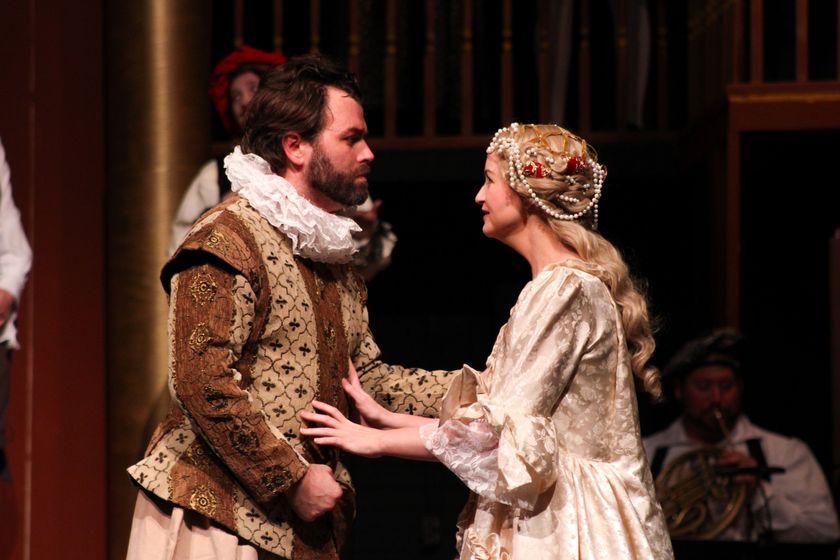- Sections :
- Crime & Public Safety
- Restaurants & Food
- Sports
- More
REVIEW: The Bard loves large in Stage Right’s production of ‘Shakespeare in Love’ at the Crighton, opening this weekend

THE WOODLANDS, TX – From page to screen to stage, ‘Shakespeare in Love’ has had quite the literary journey. The original screenplay written by John Madden (not the football guy), Tom Stoppard, and Marc Norman, was turned into a 1998 movie that dominated the awards season with multiple awards, even usurping Saving Private Ryan from receiving the ‘Best Movie’ Oscar.
A dozen or so years later, Lee Hall adapted the screenplay into a stage script, which premiered in the West End of London in 2014 and subsequently has had enormous success in touring productions and adaptations in South Africa, Japan, and Korea. And now, it’s performing at the historic Crighton Theatre in downtown Conroe as part of Stage Right’s 2024-2025 season.
‘Shakespeare in Love’ is an historic comedy – that takes many dramatic liberties – about the younger, wilder days of the Bard of Avon, who is trying to overcome writer’s block to make a name for himself in the shadow of other luminaries such as Christopher Marlowe and Richard Burbage. In stumbling into a doomed love affair with Viola de Lesseps, he starts creating the star-crossed world that will culminate in the opening production of Romeo and Juliet, weaving in the joys and pains of his doomed relationship with Viola, who herself has managed to become an integral part of the production despite the Queen’s dictate that the theatre remain male only.
In this adaptation, director John Barton transforms the nearly century old stage of the Crighton to a utilitarian representation of 1593 London, dressed completely in wood and earth tones. The multilevel set is arranged in a way that most set pieces are easily moved into place and then tucked away as needed. One side of the ‘real world’ stage is dominated by a smaller stage-within-a-stage representing both the Curtain and the Rose, the competing theatres that end up working together to bring Romeo and Juliet to life.
Script- and plot-wise, anyone familiar with the film version will be more than satisfied that all the beats are there on stage, even if sometimes with some tweaking. Instead of pouring his heart and frustrations out onto the Elizabethan version of a therapist, for instance, Will relies on the support of his frenemy Christopher Marlowe, who has an expanded presence in this version of the story.
Mounting a story like this on a modern community theatre stage isn’t without its risks. Any adaptation from screen to stage has to take into account the logistics of physical locations, and Barton’s set is in near-constant motion to travel the audience from apartment to tavern to palace to bedroom to stage to Thames River and back again. In a film, a typical scene is around three minutes, which makes for a different dynamic when performed live. Additionally, while Hollywood could afford to keep the film version pretty much in the Boy’s Club with a total of four female speaking roles, the allure of stage theatre brings out a considerable number of females seeking roles.
It’s here that Barton’s direction shines in his ability to create a full stage of ‘men’ played by female actors without straying too far from reality or turning the situation into a ‘meta’ thing inspired by Shakespeare’s frequent forays into gender-bending roles. And each actor on stage – whether a man playing a man, a man playing a woman, a woman playing a woman, a woman playing a man, and every other possible permutation – brings forth a confidence in their roleplaying that adds a considerable depth and humanity to the production.
Ryan Dineen manages to convey layers of a playwright unsure of himself and his place in the world under the guise of his tall frame and boyish grinning charm. Shakespeare’s passion is never overtaken by the humor under Dineen’s deft talent. Hallie Teague pulls double duty across the sexes as both Viola and her alter ego, Thomas Kent, her ticket to getting on stage. With only a short wig, men’s breeches, and stick-on mustache to physically separate Viola from Thomas, Teague uses her voice and body language to fine effect to make us believe that everyone else believes they’re two different people.
Newly come to the Crighton stage, Cooper Smith plays harried Rose Theatre owner Philip Henslowe, who makes a deal with the devil in the form of monied producer-wannabe Hugh Fennyman (played by Sean K. Thompson) to mount the production against rising debts and incredible odds. Smith has the ability to balance the harried life of a man who owes loan sharks with the seasoned theatre owner who instinctively knows that things will work out.
Fresh off his eponymous role in the recent production of ‘Dracula,’ Austin Atherton deftly plays the half-supporter / half-foil and rival / counterpart of Shakespeare, Christopher ‘Kit’ Marlowe. In the stage version of this story, Marlowe has a role that’s nicely expanded, even to the point of appearing on stage after his death. Atherton easily convinces us that he’s the angel on one of Shakespeare’s shoulders – coming up with vital advice such as changing the name ‘Romeo and Ethel’ to something more palatable – and the devil on the other shoulder in playing two theatre owners off of each other.
Matthew Johnson returns to the Crighton stage as the larger-than-life Richard Burbage, who in Shakespeare’s time was considered the greatest actor ever. Such a role isn’t beyond Johnson, who plays the entire stage with a loud voice and even louder costume every time he’s seen.
A triumvirate of royalty comes in the form of Lord Chamberlain Tilney, Lord Wessex, and Queen Elizabeth I, played respectively by Bob Galley, Roger R. Ramirez, and Amy Sowers. In their own way, they all play ‘bad guys’ with flair – Elizabeth in that she forbids women to act on stage and encourages a marriage of convenience in the face of deeper love – and copious amounts of humor. Ramirez is particularly effective when his Wessex lets his guard down, such as recoiling from a ghost or wondering if his own life could have a happy ending. Galley uses his height to throw his mandates around troupes of actors whose livelihoods depend on his whims. Sowers is adroit at adding humanity to the otherwise unreachable Queen Elizabeth, letting the audience know how lonely it is at the top of a man’s world.
Playing for the ‘good guys’ in this story are Melody Dixon Montez as Viola’s Nurse, who fusses and fumes but never fails to encourage and protect her lady; Ian Montez as popular thespian second only to Burbage, Ned Alleyn; and Robert Gyomber as Wabash, a stuttering debtor who has the audience – both in the play and in the auditorium – hanging on what his next word might be. All three bring unexpected layers and levels to their foibled characters and light up the stage each time they’re on.
Veteran actor Rob Baker graces the stage as Sir Robert de Lesseps, the father all too eager to marry off his daughter. In what would otherwise be a one-dimensional role whose character would fall into the ‘bad guys’ list, Baker brings a warmth and gravitas, effortlessly showing the audience what horrid things a 16th century father sometimes had to do for family survival.
Rounding out the cast is an ensemble that Barton uses to great effect. Often playing multiple alternating characters with too-short down times, this cadre of actors more than holds their own against the thankless demands of being an ensemble player. Add to that, most of the women in the cast have to realistically play male roles as well as female ones, and it’s not hard to see why special kudos go out to Rachel Sakal, David Voncannon, Dylann Cooper, Jessica Herrin, Nathaniel Voncannon (a youth who shines as future horror writer John Webster), Olivia Ham, Chelsey Kelsey Johnson, Zoe Pool, Robben Montez, and Vanessa Gray. These last two also have the considerable task of being the understudies for Will and Viola, respectively, and in fact will play those roles on the stage on Friday, April 11 and Sunday, April 13 to great effect. It would also be remiss to send a nod to Bella Rose Albright, a dog who owns the stage as Spot in one hilarious scene.
Alongside his cast, Barton has surrounded himself with an able stage and tech crew to keep the other overwhelming aspects of theatre manageable. Justine Gray is the assistant director, Wendy Albright is stage manager, Zoe Bullard is the costumer, Cordelia Barton is the lighting technician, and Tristin Webb is stage hand. An onstage band that provides the perfect blend of scene change music with comical (and dramatic) underscoring is comprised of Justine Gray, Cameron Collier, Stephen Hill, and Kellie Hill. Also to be commended is Ellie Williams for her choreography skills in period Elizabethan dance presentation.
‘Shakespeare in Love’ runs April 4 - 20, Fridays and Saturdays at 7:30 p.m. and Sundays at 2 p.m. Conroe Art League has partnered with the production to present love-themed art for sale in the lobby. For tickets, visit www.crightontheatre.org or call the box office at 936-441-7469. Theatre producers discourage you from using third party ticket sites, which frequently add prohibitively expensive surcharges and upcharges.





